The Name
The Name of the Heavenly Father
In the Book of Yahn Christ expounds on the significance of the name, and derives His very mission, mandate and purpose from Hashem YHWH, which declares the essence and being of the Heavenly Father.
It reads, "I have manifested thy name unto the men which thou gavest me out of the world" (Yahn 17:6). "While I was with them in the world, I kept them in thy name" (Yahn 17:12). "And, I have declared unto them thy name, and will declare it: that the love wherewith thou hast loved me may be in them, and I in them" (Yahn 17:26).
Here, Christ delivers a compelling treatise on the power and authority in the name—it keeps, reveals, imparts, and invokes the very substance of the Heavenly Father, and therefore by His name (YHWH's salvation) all mankind is redeemed and established.
He cries out to heaven, "Father, glorify thy name. Then came there a voice from heaven, saying I have both glorified it, and will glorify it again" (Yahn 12:28).
Christ boldly proclaims "I am come in my Father's name, and ye receive me not: if another shall come in his own name, him ye will receive" (Yahn 5:43). Indeed Christ wraps Himself in the name of YHWH, and His very name, Yahoshua or Yahshua (the latter being the shortened version), testifies of YHWH's salvation (Matthew 1:21).
Scripture teaches that "the whole family in heaven and earth is named" of the Father (Ephesians 3:14-15).
For this cause, we call on the name of YHWH, our Heavenly Father to whom all glory belongs.
The name YHWH first appears in Scripture in Genesis 2:4: "These are the generations of the heavens and of the earth when they were created, in the day that YHWH Elohim made the earth and the heaven."
In Exodus 3, we read in response to Moshe's question asking who shall he say sent him, "Ehyeh asher Ehyeh or I AM THAT I AM...YHWH Elohim of your fathers, the El of Abraham, the El of Yitschaq, and the El of Yaqob, hath sent me unto you: this is my name for ever, and this is my memorial unto all generations" (Ex 3:14-15). {See insert from PC Study Bible Interlinear Bible Program Version 3.1}
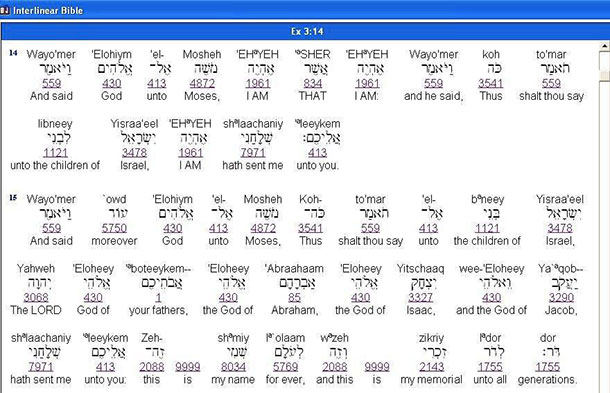
Scripture overflows with praise of the name YHWH, and repeatedly the reader is commanded to speak, honor and call on the name.
Psalm 68:4: "Sing unto Elohim, sing praises to His name: extol Him that rideth upon the heavens by His name YAH, and rejoice before Him."
Psalm 118:26: "Blessed be he that cometh in the name of YHWH."
YeshaYah 12:4: "And in that day shall ye say, Praise YHWH, call upon His name, declare His doings among the people, make mention that His name is exalted."
YirmeYah 23:26-7: Cautions the prophets not to "think to cause my people to forget my name...as their fathers have forgotten my name for Baal." {Baal interpreted here is lord. See Strongs #1167, which is the same word for #1168}
Likewise YirmeYah 20:9: Illustrates how YirmeYah had a burning fire shut up in his bones when he thought "not [to] make mention of Him, nor speak any more in His name."
While many scholars and leaders in the fivefold ministry have knowledge of the name, many choose not to uphold, teach or have relationship with the name. However, in obedience to the Holy Spirit, Bet HaShem YHWH has been ordained to restore the truth of the name of YHWH, and Christ Yahshua to the Body of Christ, and throughout the earth.
Indeed, the name of the Heavenly Father matters. He is more than a generic title or deity. He is YHWH! And, as in any intimate relationship, He has revealed His personal name as an expression of His character, and testament to the covenant He has made with mankind: to be the Great I AM in their midst.
YHWH appears in the Old Testament 6,823 times and is written יהוה in Hebrew characters—commonly referred to as the tetragrammaton, meaning four letters. Biblical Hebrew was written with consonants until the Common Era when vowels were added. In English יהוה transliterates to YHWH.
Most scholars agree that the name YHWH is pronounced YAH-WEH.1,2 Furthermore, Encyclopaedia Judaica asserts "the true pronunciation of the name YHWH was never lost."1 As evidence, scholars point to the shortened version of the name יה or YH, which is consistently pronounced YAH, as seen in Halleluyah, Nehemyah, Zecharyah and Obadyah, as well as the scripture Psalm 68:4 and YeshaYah 12:2. {See insert from the Spirit-Filled Bible}
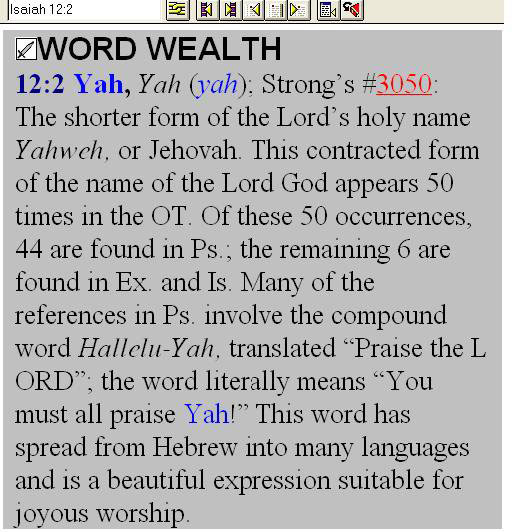
Pronunciation of the name can be confirmed also in Greek texts. According to the Encyclopedia Judaica, "several early Greek writers of the Christian Church testify that the name was pronounced 'Yahweh'."1 However, based on an old Jewish tradition, common use of the name disappeared from public discourse during the period of the Second Temple 500 B.C.E., and was replaced with Adonai—a practice that is still used today. It was taught that the name was too holy to be spoken, however, this belief is not supported by Scripture. Even so, this tradition has been passed down to Christian audiences as well, where the name YHWH is likewise substituted with LORD or God in English, El Senor in Spanish, and Der Herr in German.
In particular, the hybrid name Jehovah was invented in more recent history (i.e., it did not appear in any original Hebrew or Greek manuscripts). It was erroneously created by pronouncing the vowels of Adonai (written over or under the tetragrammaton to indicate the Jewish tradition of substitution of the name) with the consonants of יהוה (YHWH). Jehovah had been credited to Peter Galatin, the confessor of Pope Leo X, dating back to 1518 C.E., however, it was found hundreds of years earlier in a document produced by Raymond Martin in 1270 called "Pugio Fidei" (see the Jewish Encyclopedia, jewishencyclopedia.com/articles/8568-jehovah).
Also, the Preface of the New International Version (NIV) Bible explains:
"In regard to the divine name YHWH, commonly referred to as the Tetragrammaton, the translators adopted the device used in most English versions of rendering that name as 'LORD' in capital letters to distinguish it from Adonai, another Hebrew word rendered 'Lord,' for which small letters are used."
While the NIV refers to the name of YHWH in the preface, other study bibles have retained the name, including The Names of God Bible (endorsed by Rev. Billy Graham), and The New Jerusalem Bible, as well as The Amplified Bible in select instances. In addition, several bibles have referenced the name of YHWH in study notes including Zondervan's NIV Study Bible, The Spirit-Filled Bible and Thomas Nelson's Believer's Bible where the name occurs in approximately one hundred instances.
The Name of Christ
Though many churches throughout Christendom call on the anglicized name of Jesus, it is commonly known that Christ, our Savior and Messiah has a name that was prophesied from on high that was consistent with His cultural identity and calling — Yahoshua or Yahshua being interpreted YHWH's salvation.
The name of Christ was not unusual; rather, His name was rightly identifiable in Jewish culture and society.
In Matthew 1:21 the name of the Messiah is prophesied, a name that embodies His purpose and mandate: "And she shall bring forth a son, and thou shalt call His name Yahshua: for He shall save His people form their sins." In many bible versions this Scripture is properly referenced to draw the reader back to the Hebrew name "Yehoshua", (Strong's # 3091) and its translation "YHWH is salvation". The verse makes explicit sense given the meaning of His prophesied name. {See commentary excerpts below}
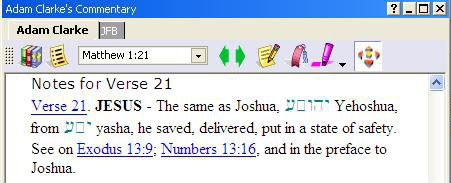
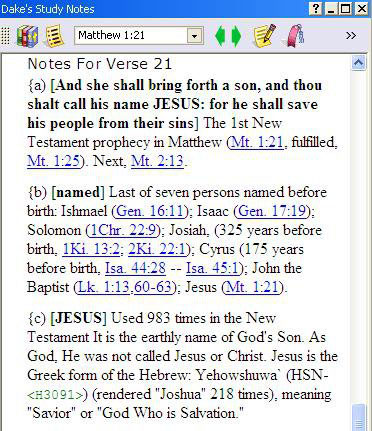
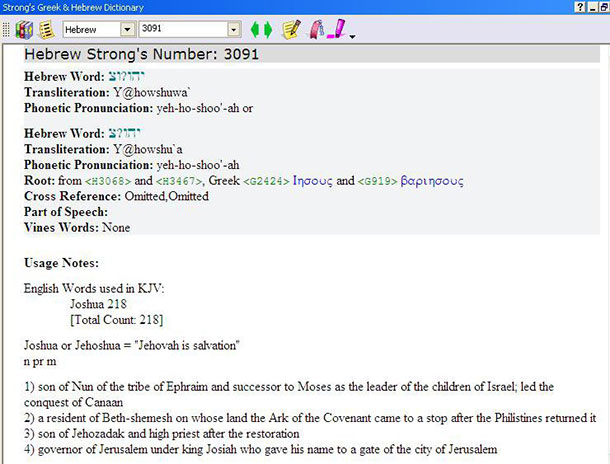
As shown in the excerpted commentary, the English name Jesus (Strong's # 2424) found in Matthew 1:21 is supposed to be the equivalent of the Hebrew name Yahoshua (Strong's # 3091) found elsewhere in Scripture. However, the English name Joshua (likewise Strong's # 3091) also corresponds to the same Hebrew name Yahoshua. {See excerpt below}

The name Yahoshua appears in Numbers 13:16 in regards to Moshe's successor, Yahoshua ben Nun (i.e., the son of Nun). Moshe changed Hoshea's name, which means salvation to Yahoshua, meaning YHWH's salvation. This was fitting because he was a type of Christ for the children of Yisrael. {See Interlinear Bible excerpts}
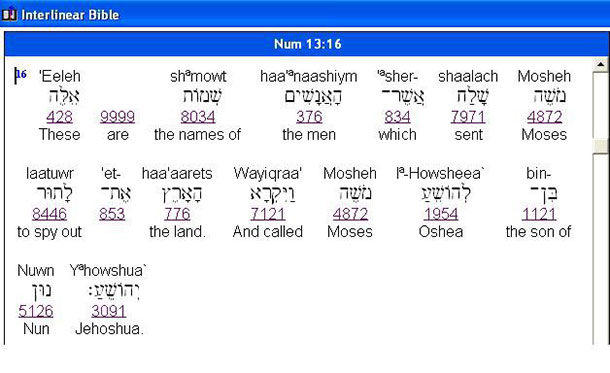
In Hebrew characters Moshe's successor's name is spelled יהושׁע. Some debate has ensued over the use of vowel points, in particular whether the letter a or e is used in the first portion of his name. Some scholars, likely drawing on a certain Jewish tradition that the name was too holy to say, have written the name as Y'hoshua whereas in other instances it has been rendered Yehoshua. However, his name was formed by adding the abbreviated YAH to Hoshea, the former whose pronunciation is known and documented throughout Scripture (see Strong's Concordance #3050). Scholarly sources such as the PC Study Bible's Interlinear Bible Program Version 3.1 retain the spelling of the name with the "a" vowel point as shown in the excerpts above and below:
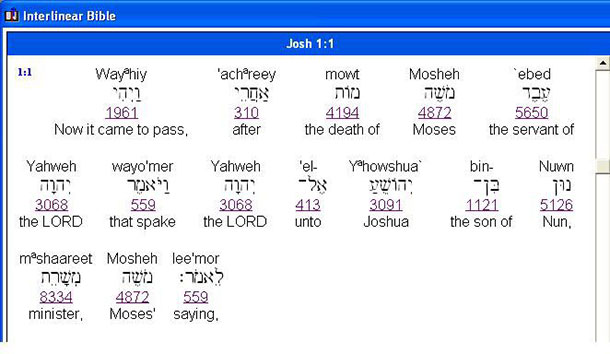
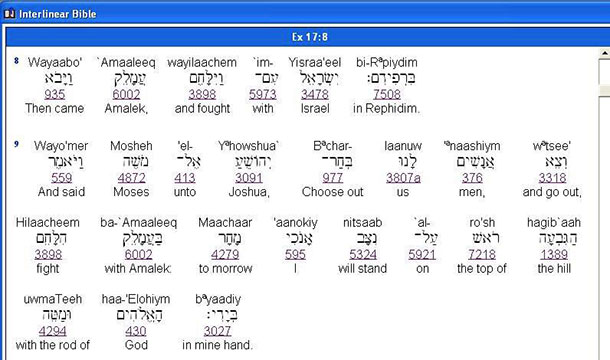
His name was transliterated into the Koine Greek as Ἰησοῦς, which corresponds to the Hebrew characters as closely as possible: written is the Greek iota, eta, sigma, omicron, upsilon and sigma. Transliteration into the English would read Iesous, however this is not pronounced "Je-sus". Like in Hebrew, there was no letter J in the Koine Greek. Appropriately, the iota and eta, Ἰη were chosen to represent the Hebrew yod, hey, יה, which retain the YAH sound. Eta is the same Greek letter that appears in the first letter of Herod's name (Greek: Ἡρῴδης). In Koine Greek the letter sigma σ is a transliteration of the Hebrew letter shin שׁ, and together the omicron and upsilon, οῦ represent the sound achieved by the Hebrew letter ayin ע.
Lost in Translation
Dr. David H. Stern in the Jewish New Testament Commentary (1992) writes, "[Matthew] 1:21 is an example of a "semitism" (an allusion to Hebrew or Aramaic) brought over literally into the Greek text. It provides strong evidence in favor of the theory that there was a Hebrew or Aramaic oral or written tradition behind the extant Greek manuscripts, for only in Hebrew or Aramaic does the explanation here of [the Messiah's] name make any sense; in Greek (or English) it explains nothing."3
Dr. Stern goes on to write, "Thus the Messiah's name is explained on the basis of what he will do. Etymologically the name Yeshua is a contraction of the Hebrew name Y'hoshua (English 'Joshua'), which means 'YHVH saves.'" Yeshua, however, shares the same root as the Hebrew word "yoshia", which is interpreted "he will save".2
He concludes, "The KJV renders this verse, '...and thou shalt call his name Jesus: for he shall save his people from their sins.' But in English, saving people from sins is no more reason for calling someone Jesus than for calling him Bill or Frank."2
Although most English versions of the bible have followed the tradition of anglicizing Christ's name, and add "Jesus" to the text, (which in effect renders Him more palatable or familiar to non-Jewish audiences), in doing so translators have employed devices of men, thereby disturbing the sanctity of Scripture and changing the historical, scriptural and ethnic identity of the only begotten Son. This practice has no linguistic or scriptural necessity. Typically, names are transliterated from one language to the next such that the pronunciation is preserved. For example, Abraham maintains its form and pronunciation from Hebrew to English manuscripts. Also, transliteration is distinct from translation. Had the name been translated, it would have been written throughout the text as YHWH's salvation. Yet, the name of Christ was not transliterated or even translated. Rather, it was thoroughly anglicized and removed from its original meaning and declaration.
Traditionally, names are changed or corrupted when one culture dominates another or co-opts the legacy of another. While the majority of the names throughout the bible are identical or nearly identical to their original forms (because names are transliterated), the name of Christ is one glaring instance where a name has been drastically revised. Even though a Jewish Messiah died to save all mankind, and engrafted both Gentiles and Jews into the promise, He never stopped being Jewish. Moreover, Christ never forced His culture upon another, and neither should men force their culture upon Him. For He is sovereign and reigns over all.
In light of these facts, translations of the Scripture have emerged such as The Names of God Bible (referenced earlier as a recent translation endorsed by Rev. Billy Graham), and the Jewish New Testament, which retain the use of Yeshua throughout.
Bet HaShem YHWH Worldwide Ministries, Inc., stands unapologetically on the inspired word and revelation knowledge of the Holy Spirit. Bet HaShem YHWH will continue to flourish and propagate truth because truth represents covenant relationship with the Heavenly Father and the Son. We proclaim boldly that as the Holy Spirit (Ruach HaKodesh) has commanded, we will make known His name, and win the lost to the glory of Christ Yahshua.
Recommended Study Tools:
PC Study Bible Interlinear Bible Program
Encyclopaedia Judaica
Jewish New Testament Commentary
1 Encyclopaedia Judaica. Volume 7 (1971). GOD, NAMES OF. Jerusalem, Israel: Keter Publishing House, Ltd. p680.
2 Lint, G. A. (1994). 30 Amazing Hebrew Words. Springfield, Missouri: World Library Press Inc.
3 Stern, D.H. (1992). Jewish New Testament Commentary. Clarksville, Maryland: Jewish New Testament Publications. p4.


